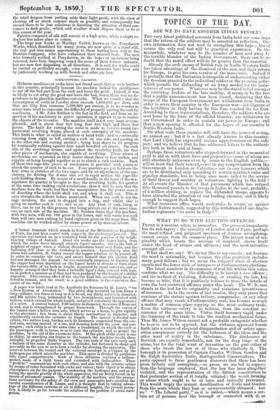TOPICS OF THE DAY.
ARE WE TO HAVE ANOTHER INDIAN REVOLT?
THE very latest published accounts from India hold out some hope that the return of the soldiers may be arrested on reflection. Our own information does not tend to strengthen this hope ; but of course the only real test will be practical experience. In the meanwhile, whatever may be the number of men sent away by the terrible blunder of the Indian Government, there can be no doubt that the moral effect will be far greater than the material. Already the arch enemy of British rule in North-Western India has taken advantage of the dismissal of the men and their return for Europe, to give his own version of the manoeuvre. Indeed it is probable that the Barbarian is incapable of understanding either the freedom granted to the individual soldier or the amazing policy which permits the disbanding of an Army needed for the main- tenance of our 13ower. Whatever may be the stated belief amongst the surviving leaders of the late mutiny, it seems to be the fact that a public announcement has been issued, declaring that the troops of the European Government are withdrawn from India in order to serve their country in the European war—intelligence of the hostilities in Italy having by this time reached the far East. According to these representations, therefore, the soldiers who are sent home by the force of the official blunder, are withdrawn by our Government in order to sustain our power in Europe ; and thus a new opening is afforded for the hopes of our enemies in North-Western India.
On what scale these enemies will still have the power of acting, we cannot say; but it is a fact already known in this country, that Lord Clyde has expressfd serious apprehensions on the sub- ject; and we believe that he has addressed letters to the authori- ties both in India and at home.
Perhaps those volunteers who stepped forward in the moment of peril to aid us with their lives and properties,—some of whom are still absolutely unknown even by name to the English public,— will at least find their reward,—not in any compensation from the Government in London or Calcutta,—not in any honours which are to be distributed only according to certain martinet rules and pipeclay standards, but in being once more called to the service of their Queen and country as volunteers fighting in the field ? At all events the blunder of that parsimony which has refused fifty thousand pounds to the troops in India, at the cost, probably, of a million sterling, to replace the disbanded troops, appears to have attracted the attention of our leading enemies, and is likely enough to suggest fresh hopes.
What insurance office would undertake to secure us against another Native revolt, suggested by this withdrawal of our Anglo- Indian regiments "to serve in Italy ?"


























 Previous page
Previous page